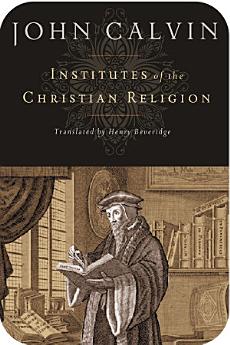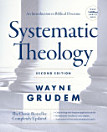Institutes of the Christian Religion
maj 2022 · Hendrickson Publishers
5,0star
1 komentreport
Libër elektronik
1104
Faqe
family_home
I përshtatshëm
info
reportVlerësimet dhe komentet nuk janë të verifikuara Mëso më shumë
Rreth këtij libri elektronik
A colossal milestone of Christian thought—at an irresistible price!
Here in a convenient one-volume edition is John Calvin’s magnum opus. Written as an introduction to the Christian life, the Institutes remains the best articulation of Reformation principles and is a marvelous introduction to biblical Christianity. Newly retypeset for clarity, this volume translated by Henry Beveridge offers a more affordable edition of one of the last millennium’s must-have works. This book will appeal to libraries, seminarians, pastors, and laypeople.
Institutes of the Christian Religion by John Calvin is an introduction to the Bible and a vindication of Reformation principles by one of the Reformation’s finest scholars. At the age of twenty-six, Calvin published several revisions of his Institutes of the Christian Religion, a seminal work in Christian theology that altered the course of Western history and that is still read by theological students today. It was published in Latin in 1536 and in his native French in 1541, with the definitive editions appearing in 1559 (Latin) and in 1560 (French). The book was written as an introductory textbook on the Protestant faith for those with some learning already and covered a broad range of theological topics from the doctrines of church and sacraments to justification by faith alone. It vigorously attacked the teachings of those Calvin considered unorthodox, particularly Roman Catholicism, to which Calvin says he had been “strongly devoted” before his conversion to Protestantism. The overarching theme of the book—and Calvin’s greatest theological legacy—is the idea of God’s total sovereignty, particularly in salvation and election.
John Calvin (1509–1564), a French theologian and reformer, was persecuted as a Protestant. As a result, he traveled from place to place. In 1534 at Angouleme he began the work of systematizing Protestant thought in his Institutes of the Christian Religion, one of the most influential theological works of all time.
Here in a convenient one-volume edition is John Calvin’s magnum opus. Written as an introduction to the Christian life, the Institutes remains the best articulation of Reformation principles and is a marvelous introduction to biblical Christianity. Newly retypeset for clarity, this volume translated by Henry Beveridge offers a more affordable edition of one of the last millennium’s must-have works. This book will appeal to libraries, seminarians, pastors, and laypeople.
Institutes of the Christian Religion by John Calvin is an introduction to the Bible and a vindication of Reformation principles by one of the Reformation’s finest scholars. At the age of twenty-six, Calvin published several revisions of his Institutes of the Christian Religion, a seminal work in Christian theology that altered the course of Western history and that is still read by theological students today. It was published in Latin in 1536 and in his native French in 1541, with the definitive editions appearing in 1559 (Latin) and in 1560 (French). The book was written as an introductory textbook on the Protestant faith for those with some learning already and covered a broad range of theological topics from the doctrines of church and sacraments to justification by faith alone. It vigorously attacked the teachings of those Calvin considered unorthodox, particularly Roman Catholicism, to which Calvin says he had been “strongly devoted” before his conversion to Protestantism. The overarching theme of the book—and Calvin’s greatest theological legacy—is the idea of God’s total sovereignty, particularly in salvation and election.
John Calvin (1509–1564), a French theologian and reformer, was persecuted as a Protestant. As a result, he traveled from place to place. In 1534 at Angouleme he began the work of systematizing Protestant thought in his Institutes of the Christian Religion, one of the most influential theological works of all time.
Vlerësime dhe komente
5,0
1 koment
Rreth autorit
Born Jean Cauvin in Noyon, Picardy, France, John Calvin was only a boy when Martin Luther first raised his challenge concerning indulgences. Calvin was enrolled at the age of 14 at the University of Paris, where he received preliminary training in theology and became an elegant Latinist. However, following the dictates of his father, he left Paris at the age of 19 and went to study law, first at Orleans, then at Bourges, in both of which centers the ideas of Luther were already creating a stir. On his father's death, Calvin returned to Paris, began to study Greek, the language of the New Testament, and decided to devote his life to scholarship. In 1532 he published a commentary on Seneca's De Clementia, but the following year, after experiencing what was considered a sudden conversion, he was forced to flee Paris for his religious views. The next year was given to the study of Hebrew in Basel and to writing the first version of his famous Institutes of the Christian Religion, which he gave to the printer in 1535. The rest of his life-except for a forced exile of three years-he spent in Geneva, where he became chief pastor, without ever being ordained. When he died, the city was solidly on his side, having almost become what one critic called a "theocracy." By then the fourth and much-revised edition of his Institutes had been published in Latin and French, commentaries had appeared on almost the whole Bible, treatises had been written on the Lord's Supper, on the Anabaptists, and on secret Protestants under persecution in France. Thousands of refugees had come to Geneva, and the city-energized by religious fervor-had found room and work for them. Though Calvin was sometimes bitter in his denunciation of those who disagreed with him, intolerant of other points of view, and absolutely sure he was right on the matter of predestination, he was nonetheless one of the great expounders of the faith. From his work the Reformed tradition had its genesis, and from his genius continues to refresh itself.
Vlerëso këtë libër elektronik
Na trego se çfarë mendon.
Informacione për leximin
Telefona inteligjentë dhe tabletë
Instalo aplikacionin "Librat e Google Play" për Android dhe iPad/iPhone. Ai sinkronizohet automatikisht me llogarinë tënde dhe të lejon të lexosh online dhe offline kudo që të ndodhesh.
Laptopë dhe kompjuterë
Mund të dëgjosh librat me audio të blerë në Google Play duke përdorur shfletuesin e uebit të kompjuterit.
Lexuesit elektronikë dhe pajisjet e tjera
Për të lexuar në pajisjet me bojë elektronike si p.sh. lexuesit e librave elektronikë Kobo, do të të duhet të shkarkosh një skedar dhe ta transferosh atë te pajisja jote. Ndiq udhëzimet e detajuara në Qendrën e ndihmës për të transferuar skedarët te lexuesit e mbështetur të librave elektronikë.








